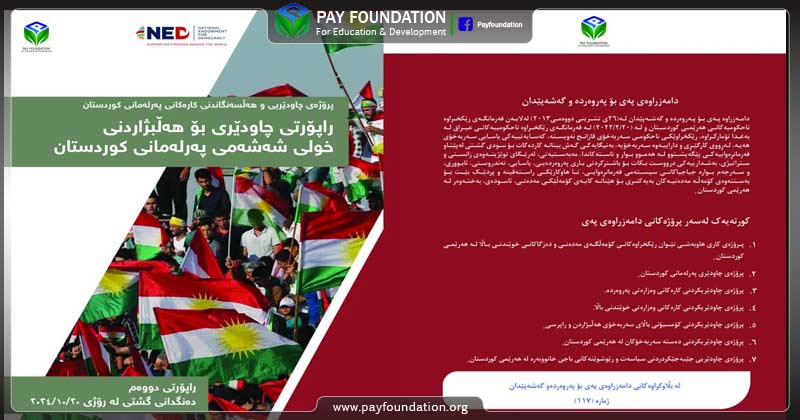- Interview with Dr. Sarwar Abdulrahman regarding the strikers
- Press Conference in Support of Striking Teachers
- Press Conference of the Islamic Union Faction on the Parliament Session
- Press Conference of the New Generation Faction in the Kurdistan Parliament
- The Kurdistan Parliament Did Not Release Any Statement About Today’s Session
- Mohammed Suleiman Steps Down as Acting Speaker; Azad Mohammed Becomes Acting Speaker of the Kurdistan Parliament

PAY Organization Releases Second Report on Parliamentary Elections
Today, 1-12-2024, the PAY Organization for Education and Development released its second report regarding the process of the sixth parliamentary elections of Kurdistan.
The report covers (pre-election procedures, campaigning, nature of the candidates, private and general voting processes, announcement of preliminary and final results, observations of participating parties and observers, irregularities and invalid votes, and possibilities of fraud) in the election. In conclusion, the findings reached by the PAY Organization and the necessary recommendations to the relevant parties have been presented.
In the preface of the report, the PAY Organization wrote:
"On November 20, 2024, the elections for the sixth term of the Kurdistan Parliament took place, which should have been conducted two years earlier. The reasons for the delay return to conflicts between the ruling parties that couldn't agree; each time one would boycott. On the other hand, the lack of responsibility and absence of the parliament and its presidency, which had several related duties they should have fulfilled but procrastinated and didn't carry out, such as reactivating the Election and Referendum Commission, amending the election law and aligning it with other related laws, cleaning the voter registry, bringing parties together regarding the issue of reserved seats and election thresholds, and many others.
In any case, after two years of legal vacuum and absence of the parliament in the region, the election was held. This election was different from the previous term's election. On one hand, the responsibilities of the regional commission were handed over to the Iraqi Independent High Electoral Commission. On the other hand, the amendment of the law was taken out of the hands of the Kurdistan Parliament and was amended by the decision of the Federal Supreme Court. Instead of one phase, the election was conducted in four phases. The number of reserved seats for minorities decreased from (11) to (5) seats, and the general seats were reduced from (100) to (95) seats.
Some political parties, although they desired the election to be postponed once again, couldn't continue with this stance in the face of the decisions of the Federal Supreme Court and were compelled to proceed. Thus, the election campaign began, filled with propaganda and mass gatherings, during which fiery speeches were presented, their members were motivated, party disagreements were inflamed, and the old pages of the past were reopened against each other. Instead of presenting their service programs, they blamed each other. This caused many citizens to fear the creation of division and conflict, especially between the supporters of the two main rival parties (KDP and PUK). In the possibility of occurrence, controlling it would be difficult. But what was reassuring is that no dangerous incident occurred.
During the campaign, each side awaited their hopes. In the media, they exaggerated their expected number of seats. In such a way that if we consider the number of seats each party expected to obtain, it might exceed (150) seats, contrary to the reality that the total number of seats was only (95) seats.
What was noteworthy in this election was the stance of the participating lists. The Patriotic Union of Kurdistan entered the election campaign with great enthusiasm and believed it would obtain the most votes. They even raised slogans like "We will end it" and "We will take Erbil back." But when the results were announced, to a large extent, the votes of the KDP shocked them.
The Kurdistan Democratic Party from the beginning was saying that the election was "engineered" and did not hide their concerns and fears. But later, they remained silent about the election. This raised the question: So, was the election engineered or not? If it was engineered, why were they silent and how did they obtain those votes? If it was not engineered, why did they before the election announce that with external support, the seats were predetermined?
Other parties, the "opposition," insisted that a clean election would be conducted and in no way would fraud occur. But when the results were announced, all of them protested and contradicted their previous statements, declaring that the election was "engineered" and that extensive fraud had taken place. When it came to providing evidence of the results, there was nothing at the level of the event. Compared to what they were talking about, they presented minimal complaints and minimal evidence. If fraud on such a large scale was carried out, how could it be that out of a total of (7,067) ballot boxes and polling stations, with (16) dissatisfied parties, only (189) complaints were submitted and only (26) stations were closed and investigated? If not, how can such a large-scale fraud that they talk about have only (41) cases and none of them be serious!? This reveals either the weakness of the opposition parties, who until now have not known themselves nor their opponents nor understand the method of election work! Or that the scale and support of the fraud was so large, organized, and backed by internal and external forces, that it was beyond the control of the dissatisfied parties!
Its second report regarding the process of the sixth parliamentary elections of Kurdistan in PDF

